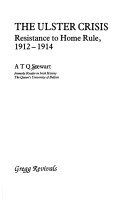Modern revivals in history
2 total works
This is an account of the years immediately preceding World War I. Britain faced its gravest political crisis since the days of Cromwell and Charles I. The Liberal Government was determined to grant Home Rule to Ireland, to prevent it, the Conservative opposition was willing to jeopardize the Constitution. And in the North of Ireland, a citizen army of 100,000 Ulster Protestants, led by Edward Carson and armed with smuggled German rifles, prepared to resist by force any attempt to eject them from the United Kingdom. A.T.Q. Stewart is the author of "The Pagoda War: Lord Dufferin and the Fall of the Kingdom of Ava", "The Narrow Ground: Aspects of Ulster, 1609-1969", "Edward Carson", "A Deeper Silence: The Hidden Origins of the United Irishmen" and "The Summer Soldiers: The 1798 Rebellion in Antrim and Down." In 1977, he was a joint winner of the first Christopher Ewart-Biggs Memorial Prize for "The Narrow Ground".
Features recorded by Parliamentary Commissions on civil disorder in Northern Ireland during the 19th century include: barricades in the streets, allegations of bias against the police, "no-go" areas, joint army and police patrols, "snatch-squads", Catholic gun clubs and a Protestant Defence Association, soldiers forming a "peace line" between the Shankill and the Falls, and battles in Bogside. Therefore the view that the present troubles in Ulster are simply the product of Irish history is widely accepted. But how, exactly does the influence of the past operate on the present? This book examines five important aspects of Ulster history since 1609, when the Plantation of Ulster began, and in the mosaic of rebellion, siege, secret armies, marches, ambushes, and riots suggest a new interpretation of what had been going on in Ulster since 1969. "The Narrow Ground", first published in 1977, is a joint winner of the Ewart-Biggs Memorial Prize.

